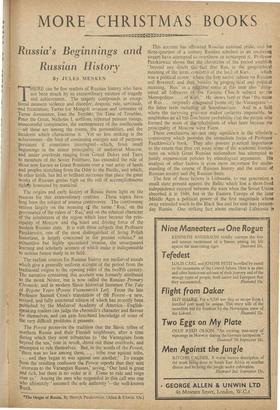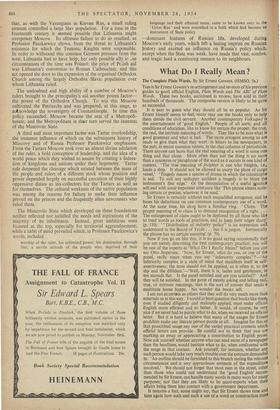MORE CHRISTMAS BOOKS
Russia's Beginnings and Russian History
By JULES MENKEN
THERE can be few readers of Russian history who have not been struck by its extraordinary mixture of tragedy and achievement. The tragedy compounds in excep- tional measure violence and disorder, despotic rule, servitude, and frustration; Tartar (or Mongol) invasion and centuries of Tartar dominance, Ivan the Terrible, the Time of Troubles, Peter the Great, Nicholas 1, serfdom, repeated peasant risings, unsuccessful conspiracies, the estrangement of the intellectuals --all 'these are among the events, the personalities. and the incidents which characterise it. Yet no less striking is the achievement—the fruit of continuing energies and of purposes persistent if sometimes interrupted—which, from small beginnings in the minor principality of medimval Moscow, and under overlords ranging from Grand Dukes and Tsars to members of the Soviet Politburo, has extended the rule of those now known as Great Russians over a vast array of lands and peoples stretching from the Oder to the Pacific, and which, in other fields, has led to brilliant successes that place the great works of Russian genius high on the roll of accomplishments right/ honoured by mankind. .
The origins and early history of Russia throw light on the reasons for this extraordinary contrast. These topics have long been the subject of intense controversy. The controversy centres largely on the meaning of the name ' Rus,' on the provenance of the rulers of ' Rus,' and on the ethnical character of the inhabitants of the region which later became the prin- cipality of Moscow and the. heart and driving force of the modern Russian state. It is with these subjects that Professor Paszkiewicz, one of the most distinguished of living Polish historians, is largely concerned in the present volume,* an exhaustive but highly specialised treatise, the unsurpassed learning and scholarly acumen of which make it indispensable to serious future study in its field.
The earliest sources for Russian history are mediveval annals which give a generally uniform account of the period from the traditional origins to the opening years of the twelfth century. The narrative containing this account was formerly attributed to the monk Nestor, but is now called the Russian Primary Chronicle, and in modern Slavic historical literature The Tale of Bygone Years (Povest Vremennykh Let). From the late Professor Samuel Cross's translation of thb Povest—a new, revised, and fully annotated edition of which has recently been published by the Mediaeval Academy of America--English- speaking readers can judge the chronicle's character and flavour for themselves, and can gain first-hand knowledge of some of the very difficult problems it presents.
The Povest preserves the tradition that the Slavic tribes of northern Russia and their Finnish neighbours, after a time during which they were tributaries to ' the Varangians from beyond the sea,' rose in revolt, drove out these overlords, and attempted to rule themselves. But, in the words of the Povest, ' there was no law among them, . . . tribe rose against tribe, • • . and they began to war against one another.' To escape from the resulting confusion the Povest reports that they sent This account has affronted .Russian national pride, and for three-quarters of a century Russian scholars in an unceasing stream have attempted to overthrow or reinterpret it. 'Professor Paszkiewicz shows that the chronicles of the period establish beyond any doubt Elie fact that Rus,. in the geographical meaning of the term, _consisted of the land of Kiev, . . . which was a political centre ' where the tirst native zulture on Russian soil flowered; and that, besides its geograr hical and political meaning, Rus' in a r*gious sense at this time also ' desig- nated all followers of `the Eastern ChurAi subject to the Metropolitan . . . of Kiev.' He shows flirt': er that the name of Rus . . . originally designated [some ofj the Varangians'-- the latter term including all Scandinavians. And in a field where the surviving evidence makes .certainty impossible, ho • establishes an all but conclusive probability tact the people who formed the mass of the inhabitants of what later became the principality of Moscow were Finns.
These conclusions are -not .only significant in the scholarly controversy which provides the immediate focus of Professor Paszkiewicz's book. They also possess practical' importance to the extent that they cut away some of the academic founda- tions on which Great Russian nationalism has attempted to justify expansionist policies by ethnological arguments. His analysis -of other factors is even more imdortant for under- standing of the course of Russian history and the nature of Russian society and the Russian State. The first of these factors is Lithuania, to our generation a small state pressed against the Baltic which lost a short-lived independence enjoyed between the wars when the Soviet Union absorbed it in 1940, but in the Eastern Europe of the later Middle Ages a political power of the first magnitude whose sway extended south to the Black Sea and far east into present- day Russia. One striking fact about mediaeval Lithuania is that, as with the Varangians in Kievan Rus, a small ruling stratum controlled a large Slav population. For a time in the fourteenth century it seemed possible that Lithuania might overpower Moscow. Its ultimate failure to do so resulted, as Professor Paszkiewicz shows, from the threat to Lithuania's existence for which the Teutonic Knights were responsible. In order to withstand this constant German pressure from the west, Lithuania had to have help; her only possible ally ir, circumstances of the time was Poland: the price of Polish aid was Lithuania's conversion to Roman Cathoiicism; and this act opened the door to the expansion of the organised Orthodox Church among the largely Orthodox Slavic population over whom Lithuania ruled. • The undoubted and higb ability of a number of Moscow's rulers brought to the principality's aid another potent factor— the power of the Orthodox Church. To win this Moscow cultivated the Patriarchs and was prepared, at this stage, to acknowledge the sovereignty of Constantinople. In time this policy succeeded; Moscow became the seat of a Metropoli- tanate; and the Metropolitans in their turn served the interests of the Muscovite State.
A third and most important factor was Tartar overlordship, the immense influence of which on the subsequent history of Muscovy and of Russia Professor Paszkiewicz emphasises. From the Tartars Moscow took over an almost divine adulation of the ruler, a bold conception of leadership, and the idea of a world peace which they wished to assure by creating a federa- tion of kingdoms and nations under their hegemony. Tartar rule deepened the cleavage which existed between the mass of the people and rulers of a different stock whose position and power depended largely on successful execution of their highly oppressive duties as tax-collectors for the Tartars as well as for themselves. The cultural weakness of the native population was among the reasons for failure to make their influence prevail on the princes and the frequently alien newcomers who ruled them.
The Muscovite State which developed on these foundations neither reflected nor satisfied the needs and aspirations of the majority of its inhabitants. Instead, great ambitions were fostered at the top, especially for territorial aggrandisement; while a habit of mind prevailed which, in Professor Paszkiewicz's words, included
worship of the ruler, his unlimited power, his domination through fear, a servile attitude of the people who, deprived • of their
language and their ethnical name, came to be known only as the ' Great Rus' and were nourished in a faith which had become an instrument of State policy —dominant features of Russian life, developed during Moscow's early years, which left a lasting imprint on Russian bistory and exerted an influence on Russia's policy which, except when the State was weak, have made that vast, sombre, and tragic land a continuing menace to its neighbours.











































 Previous page
Previous page